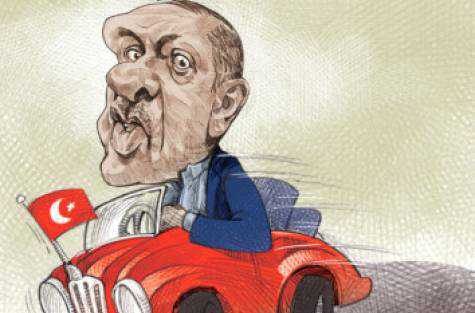Discovering at the eleventh hour that Turkey was about to be marginalised over Geneva II and regional diplomacy in general, the prime minister has thrown himself whole-heartedly into the thick of it
- By Abdel Bari Atwan | Special to Gulf News
- Published: 20:00 December 2, 2013
 :
:What a difference 24 months can make. In November 2011, Tehran was fuming over Turkey’s agreement to host a Nato missile shield designed to protect Israel from retaliation if it attacked Iran. The Iranian Revolutionary Guard’s head of aerospace vowed that any foreign attack would see Iran strike Turkey.
In October 2012, Turkish fighter jets intercepted a Syrian passenger plane suspected of carrying weapons for the Bashar Al Assad regime, as it flew from Moscow to Damascus. Although the plane was subsequently allowed to continue its journey, the incident greatly angered the Russian federation.
Since the beginning of the Syrian crisis, Turkey has been the most outspoken and pro-active supporter of the opposition, driving an even bigger wedge between Shiite allies Tehran and Damascus and Sunni Ankara.
Last week, however, Turkey appeared to look around at the rapidly changing regional scenario and begin a determined diplomatic U-turn.
First, a top-level Turkish delegation — comprising Prime Minister Recep Tayyip Erdogan, Foreign Minister Ahmet Davutoglu and Energy Minister Taner Yildiz — arrived in Russia for an official two-day state visit and a meeting of the Turkish-Russian high-level cooperation council. Erdogan asked Russian President Vladimir Putin to organise a seat on the Shanghai Cooperation Council — a snub to the European Union which has littered Turkey’s accession to its ranks with obstacles. On Syria, Putin boasted of Russia’s role in ‘persuading the regime’ to attend the January 22 Geneva II peace conference and asked Turkey to convince the opposition to do likewise. Markedly absent was Turkey’s former insistence that Al Assad’s departure was a nonnegotiable precondition for the talks, although Erdogan suggested that the conference might “buy time” for the re
Last Wednesday, Davutoglu went to Tehran to meet his Iranian counterpart, Mohammad Javad Zarif. It was all-smiles and handshakes as the two men announced that Iran and Turkey would “cooperate to defuse the crisis and stop the bloodshed in Syria”. In a major breakthrough, they jointly called for a ceasefire ahead of Geneva II and pledged that “both sides will work … to encourage the opposing sides in Syria to agree”. Davutoglu was also granted a tete-a-tete with the new Iranian President, Hassan Rouhani, who announced his intention to visit Ankara in January.
Clearly, all of the above represent a major change of attitude in Ankara.
Erdogan’s position on Syria initially afforded him many powerful allies, but one by one, they have dropped off. The US and Europe have stepped back from the frontline to reconsider their strategy and loyalties — Washington’s shock rapprochement with Tehran, in particular, reset the whole region’s political paradigm. In addition, Erdogan’s support for deposed president Mohammad Mursi in Egypt has alienated the Gulf states — whose investments helped Turkey become the regional economic miracle — and led to Cairo’s military junta expelling the Turkish ambassador.
Other developments have also pushed Erdogan on the back foot:
First, the de facto liberation of Syria’s Kurdish regions, which Ankara sees as a threat to its own national integrity and security. Eighteen million of the region’s 38 million Kurds live in Turkish territory. Ankara views the independence movement, the Kurdistan Workers Party (PKK), as “terrorist” and its leader, Abdullah Ocalan, is currently languishing in a Turkish jail.
Second, the Barack Obama administration’s surprise bilateral agreement with Moscow on Syrian chemical weapons disarmament, which put a halt to the military strike everyone believed was imminent. Coupled with Washington’s volte face on Iran, it is now clear that Obama favours political, rather than military, solutions in both theatres.
Third, Turkey’s internal situation is experiencing some turbulence: The Alevi minority, a Shiite sect with links to Al Assad’s Alawite sect, has been taking to the streets in the thousands following the death, in police custody, of one of their members, Ahmet Atakan. Protests over environmental issues too have become a focal point for opposition groups in Turkey.
Fourth, jihadist groups have been able to recruit Turkish youths to fight in their ranks in Syria. Turkish intelligence puts the number of Turks currently fighting with Al Qaida affiliate, the Islamic State of Iraq and Shams (ISIS) and Jabhat Al Nusra at around 500. A ‘blowback’ — when radicalised youths return home after jihad — is of concern to all governments.
It is not surprising, then, that Ankara has been casting around for new alliances and greater security. Apart from visits to Iran and Russia, Turkey has signed new arms deals with China and instigated rapprochement with Iraq, which Davutoglu visited two weeks ago.
Turkey’s A-list Russian charm offensive testifies to Moscow’s upward trajectory on the international stage, largely due to its diplomatic triumphs on Syria. Erdogan arrived in St Petersburg a day after Israeli Prime Minister Benjamin Netanyahu left Moscow, having unsuccessfully tried to disrupt last week’s historic agreement between Iran and the 5+1 group of powers (US, Britain, France, Russia, China + Germany).
Saudi intelligence chief Prince Bandar Bin Sultan has also called on Putin in recent months and it appears to be the season of pilgrimage to the Kremlin by Washington’s veteran allies who suddenly find themselves alone.
Erdogan is a pragmatic leader, who is prepared to change course when circumstances and national interests so dictate. Discovering at the eleventh hour that Turkey was about to be marginalised over Geneva II and regional diplomacy in general, Erdogan has thrown himself whole-heartedly into the thick of it. We would not be surprised if the coming days or weeks see Davutoglu packing his suitcase once more and heading for Damascus to meet Al Assad.
Abdel Bari Atwan is the former editor of the pan-Arab newspaper Al Quds Al Arabi. His latest book is After Bin Laden: Al Qaida, the Next Generation.
